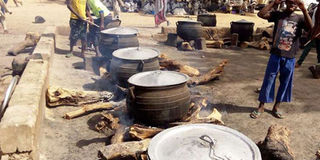Fragile peace in Nigeria despite gains against Boko Haram

Displaced persons prepare food for lunch in an open-air kitchen for people displaced by Boko Haram violence on May 19, 2016 in the Dalori Internally Displaced People's (IDP) Camp, near Maiduguri, northeast Nigeria. On July 15, 2016, trucks laden with goods and passenger vehicles have since been plying the road under military escort and a state government committee has been formed to oversee transportation. PHOTO | AFP
What you need to know:
- But locals in the northeast say the Islamists are still a security risk and far from defeated.
- But it is fragile peace, as Boko Haram is still attacking villages and Nigerian troops in the region.
KANO, Friday
Nigeria’s military has clawed back swathes of territory held by Boko Haram, opening up routes once infested with Islamist fighters, allowing life to resume for people in the remote region.
But locals in the northeast say the Islamists are still a security risk and far from defeated, sounding a note of caution to government and military claims that victory is near.
Aid agencies, meanwhile, have said parts of Borno state remain inaccessible, highlighting the threat of severe acute malnutrition — and even famine — to tens of thousands of people.
Certainly, there has been progress compared to 2014, when the militants controlled territory the size of Belgium with a self-declared caliphate that threatened Nigeria’s sovereignty.
Last week, the military announced the reopening of the strategic 140-kilometre trade route linking the Borno state capital Maiduguri to Gamboru on the border with Cameroon.
Trucks laden with goods and passenger vehicles have since been plying the road under military escort and a state government committee has been formed to oversee transportation.
“From our records over 5,000 people have returned to Gamboru in the past week following the reopening of the route,” one official on the committee, who asked not to be identified, told AFP.
“We have so far organised two trips to Gamboru involving 100 articulated trucks and 116 passenger vehicles.”
Boko Haram seized Gamboru in August 2014, prompting thousands to flee to Fotokol on the other side of the river that forms the border with Cameroon.
Chadian forces, who have been involved in the regional counter-insurgency, retook Gamboru in February 2015 after intense fighting that left hundreds of insurgents dead.
Residents began returning the following month and since the road reopened, there has been “a huge influx” of people from Maiduguri, said resident Umar Ari.
“Commercial activities are fast picking up with the resumption of supply of goods from Maiduguri. Some people have started rebuilding their homes,” he added.
“Residents of Gamboru have resumed work on their farms that have been lying fallow for two crop seasons.”
But it is fragile peace, as Boko Haram is still attacking villages and Nigerian troops in the region.





